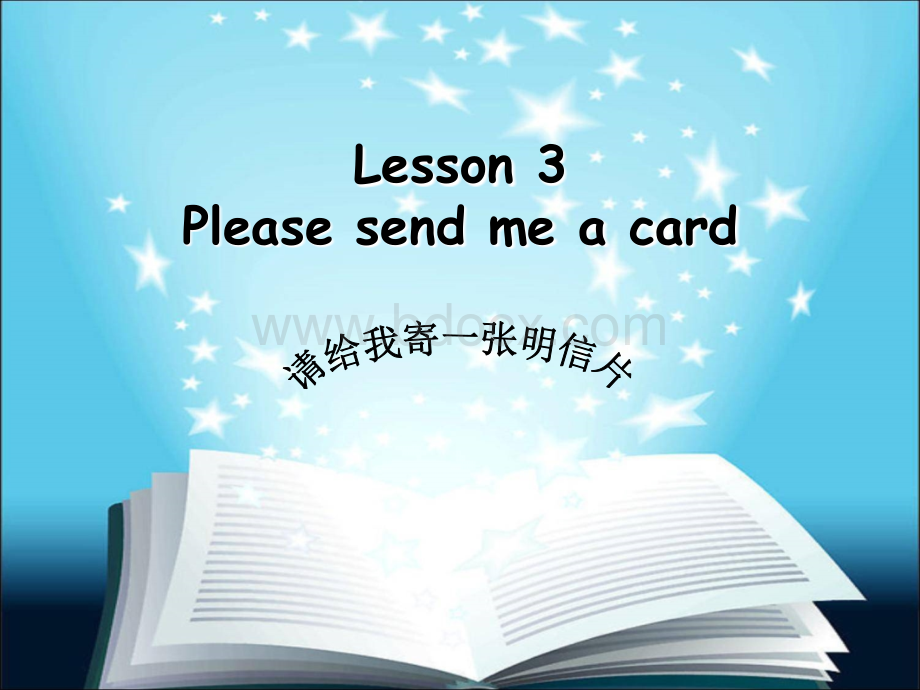新概念英语第二册Lesson3课件.ppt
《新概念英语第二册Lesson3课件.ppt》由会员分享,可在线阅读,更多相关《新概念英语第二册Lesson3课件.ppt(25页珍藏版)》请在冰豆网上搜索。

Lesson3PleasesendmeacardLead-inHowmanycardsdidthewritersend?
Whatdidhethinkabouteveryday?
Whatdidhethinkabouteveryday?
Whatdidhethinkabouteveryday?
Whatdidhethinkabouteveryday?
Didhewriteanycardsornot?
Newwords&Expressions1sendsendv.寄,送2postcardpustk:
dn.明信片3spoilspilv.使索然无味,损坏4museummju:
zimn.博物馆5publicpblika.公共的6friendlyfrendlia.友好的7waiterweitn.服务员,招待员8lendlendv.借给9decisiondisinn.决定10wholehula.整个的11singlesigla.唯一的,单一的Newwordsusend/send/1)sendsth.tosb./sendsb.sthsendaletter寄信类似的用法还有give,take,pass,read,sell,show.3a-P152send/takechildrentoschoolsend/take区别:
take强调某人亲自送;send则是通过第三人去送,如美国的校车。
例如:
Tomsfathersendshimtoschooleveryday.Marytookhersontoschoolyesterday.与与send搭配的常用短搭配的常用短语sendfor召唤,派人去叫召唤,派人去叫Didyousendforataxi?
你刚才叫出租车了吗?
你刚才叫出租车了吗?
sendout发出,发送发出,发送遣送,解雇遣送,解雇sendback归还归还sendin提交提交派遣派遣sendup发射发射,使,使.上升上升spoil/spl/v.损坏,破坏(主要指精神上)过去式,过去分词:
spoiledorspoiltDontlethimspoilyournightThebadweatherspoiledmymindv.宠坏,溺爱Heisaspoiledchild.Shespoiledhersonbygivinghimtoomuchmoney.public/pblik/1)公共的:
publicschool/place/house(pub酒吧)2)反义词:
private3)短语:
inprivate私下里的-inpublic公开的例如:
Whynothaveaconversationinpublic?
Wearegoodfriendsinprivate.Lend/lend/1)过去式,过去分词:
lentlent2)lend/borrow区别借出:
lend;lendsth.tosb=lendsb.sth.例如:
Afriendlywaiterlentabooktome.借进:
borrow;borrowsth.fromsb.例如:
IborrowedabikefromTed.spend/spend/v.用,花用,花销spendsomemoney/sometimeonsth/ondoingsthspend300yuanonanewTV-setspendmuchtimeonsportsIspend10yearstolearnEnglishwell.Wespend3hoursontheNBAfinalgameslastnight.single/sgl/1)唯一的,单一的:
反义词唯一的,单一的:
反义词double例如:
例如:
Therewasntasinglebusinthestree2)未婚的,独身的:
反义词未婚的,独身的:
反义词married已婚的已婚的例如:
例如:
Sheisstllsinglenow.1)postcard=card2)IDcard身份证creditcard信用卡cashcard现金卡namecard/visitingcard名片例如:
Hereismynamecard.各种卡片的英文说法birthdaycard生日卡Christmascard圣诞卡New-Yearcard新年卡Identitycard身份证preferentialcard优惠卡studentcard学生证scorecard积分卡membershipcard会员卡intelligencecardIC智能卡entrycard入境卡4.museum/mju:
ziEm/n.博物馆例如:
LastweekIwenttothesciencemuseum.1)扩展:
thePalaceMuseum故宫theSummerPalace颐和园thesciencemuseum科学博物馆6.friendly/frendlI/adj.友好的1)构词法:
名词friend+ly构成形容词;类似的词:
lovely,fatherly,brotherly2)反义词:
unfriendly3)短语:
inafriendlyway例如:
Theytalkedeachotherinafriendlyway.befriendlytosb.例如:
Mr.Leeisveryfriendlytous.9.decision/dIsIVEn/n.决定1)makeabig/greatdecision=makedecisions=makeuponesmind例如:
TodayImadeabigdecision.2)v.decidedecidetodosth.例如:
Idecidedtobuyanewcar.3)decide/makeuponesminddecide指经过考虑对疑难问题、争端等做出决断,含有下决心取舍的意思。
Decide后常接动词不定式和从句。
例如:
Theboydecidedtobecomeasailor.Theycouldntdecidewhattheyshoulddonext.makeuponesmind指毫不犹豫的做出决定,意味着“打定主意,下定决心”。
Makeuponesmind后常接动词不定式,一般不接从句。
例如:
Hesmadeuphismindtobeadoctor.Ivemadeupmymindtobuyanewcar10.whole/hEul/adj.整个的whole/all区别whole和all都有“全部的”意思,但其用法有区别:
1)whole和all都可用在表示整体的单数名词之前,但限定词的位置不同all+限定词+单数名词;限定词+whole+单数名词例如:
Thewholecityarebusycleaningthestreets.Allthecityarebusycleaningthestreets.2)whole和all可接复数名词,结构也有所不同all+限定词+复数名词;thewholeof+复数名词例如:
Allthestudentsarehere.Thewholeofthestudentswenttothecinema.3)whole一般不能修饰不可数名词或物质名词。
修饰复数名词时,一般其前有数量词。
而all能用于各种情况例如:
Tomdrankallthewaterinthebottle.Myfatherwillstayinbedforthreewholedays.ListentothetapeHowmanycardsdidthewritersend?
Postcardsalwaysspoilmyholidays.Lastsummer,IwenttoItaly.Ivisitedmuseumsandsatinpublicgardens.AfriendlywaitertaughtmeafewwordsofItalian.Thenhelentmeabook.Ireadafewlines,butIdidnotunderstandaword.EverydayIthoughtaboutpostcards.Myholidayspassedquickly,butIdidnotsendcardstomyfriends.OnthelastdayImadeabigdecision.Igotupearlyandboughtthirty-sevencards.Ispentthewholedayinmyroom,butIdidnotwriteasinglecard!
Explainthetext1)alittleItalian:
语言不可数,所以要用alittleItalian或afewwordsofItalianalittle/little/afew/few的区别:
alittle/afew都用肯定句,分别表示“有一点”和“有几个”,但alittle修饰不可数名词;afew修饰可数名词复数little/few都用否定句,分别表示“没有多少”和“没有几个”,但little修饰不可数名词;few修饰可数名词复数2)teachsb.sth.=teachsth.tosb.lendsb.sth.=lendsth.tosb.sendsth.tosb.=sendsb.sth双宾语英语中许多动词带两个宾语,即直接宾语和间接宾语。
间接宾语通常是人,直接宾语通常是物。
例如:
Helentmeabook.=Helentabooktome.Heboughtmeabook.=Heboughtabookforme.间接宾语人在后面时,其前必须加间接宾语人在后面时,其前必须加间接宾语人在后面时,其前必须加间接宾语人在后面时,其前必须加to(对而言)或for(为而做)例如:
Pleasegiveabooktome.IboughtabookforyouHetookflowerstohiswife.Sheorderedsoupforyou.关于花费的多种方法:
1)spend多用于人作主语,后接金钱或时间。
sb.spend时间地点例如:
Ispendmyweekendatmymothers.sb.spend时间(in)doingsth.例如:
Hespenttwohour(in)finishinghiswork.sb.spend时间onsth.例如:
Tomhavespentadayonhishomework.2)pay常与for连用,表示“付款”sb.paysm.forsth.例如:
HowmuchshouldIpayforthesebooks?
Youwillhavetopayforwhatyouhavedone.3)cost常用物作主语,表“价值或花费多少钱”。
sth.costsb.sm.例如:
Thiscomputergamecostsme30yuan.Howmuchdoestheapplecost?
4)take常用于Ittakes(took)sb.so